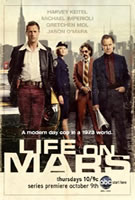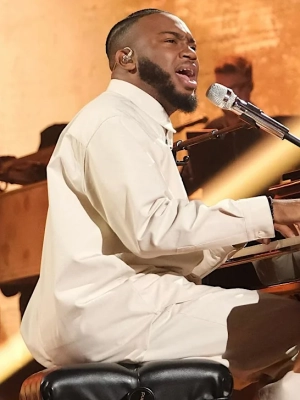Life on Mars Episode 1.03 My Maharishi is Bigger than Your Maharishi
- Jason O'Mara as Detective Sam Tyler
- Harvey Keitel as Lieutenant Gene Hunt
- Michael Imperioli as Detective Ray Carling
- Gretchen Mol as Annie Norris
- Jonathan Murphy
- Lisa Bonet as Detective Maya Daniels
- Chad Hessler
- Matthew Backer
- Brian Avers
- Nimo Gandhi
- Marc Scrivo
- Tom Hatton
- Andre De Shields
- Dean Winters
- Jaron Farnham
- Arnie Burton
- Tanya Fischer
- John Cenatiempo
- John D'Leo
- Susan Misner
- Timothy Adams
Sam, Chris and Ray walk through a park to get to a crime scene. Sam vividly remembers playing in that very park as a 3 year-old. The detectives push their way through a throng of hippies gathered to see The Maharishi, a man who chants philosophical gibberish from a tent with three diamonds embroidered on the side. Ray rants about his hatred for hippies as the men arrive at their destination, a murder crime scene. The dead man's personal effects reveal he is Robert Reeves, Jr., 31, and a Navy veteran.
Chris and Ray groan and tell Sam that nothing makes the already hotheaded Lt. Hunt more enraged than when a veteran is killed. Sure enough, Hunt furiously demands that his men capture whatever scum is responsible immediately.
Sam and Ray question Reeves' wife, Carrie Ann. She can't think of anything unusual leading up to the murder except that Reeves was happy to get a call from his former squad leader, John Fisher. Sam goes outside where Annie is consoling the son, 12 year-old Robbie. Sam tries to comfort Robbie by recounting how his father took him to see the Knicks in the NBA Finals shortly before abandoning his family. This story jars Sam's memory; his family lived all over the country when he was a child, but if he saw the Knicks win a championship, he must have lived in New York City in 1973! Sam wonders if maybe -- just maybe -- finding himself as a child could lead him back to 2008.
Ray and Sam visit John Fisher, Reeves' squad leader, now a well-to-do businessman who walks with a limp. Fisher recalls that Reeves seemed bothered by the lack of respect shown to him by hippies and freaks protesting the war.
The detectives head to a psychedelic party in a Greenwich Village loft to find Sticker, the leader of an antiwar group accused of assaulting veterans. Ray and Chris question Sticker, but Sam is distracted by a boy at the party who looks like his 3 year-old self. Is he hallucinating? Sam tries to follow the boy and gets lost and finds himself in a room with the Maharishi and his followers. His eyes transfix on the three diamonds painted on the Maharishi's forehead, and Sam goes into a trance. The Maharishi offers philosophical non-sequiturs to Sam like, "Now is all there is." Still entranced, Sam gazes past the diamonds and sees the boy again, but Windy interrupts his gaze, the boy disappears.
Sam awakes the next morning at his apartment; Windy explains that he blacked out. Sam wonders aloud what is real and what is imaginary in his situation. He describes a specific childhood memory; he kept his G.I. Joes hidden in a Thom McCan shoebox under a baseboard in his bedroom. Is that memory real?
Annie and Sam interview the accountant Lawrence Jones, whose business card was found in Reeves' car. He seems irrelevant to the case until Annie suggests Jones might be gay. Sam leaps to the possibility that Reeves and Jones might have had a sexual relationship. Sam discloses this theory to Lt. Hunt, who is insulted at the very suggestion that a war hero might be a homosexual. Sam is taken aback by his co-workers' regressive views while Hunt demands concrete evidence of his theory.
When Sam and Annie approach the Reeves home, Robbie quickly hides something in his pocket. Sam tries to comfort the boy again by talking about his father taking him to a Knicks game. He recalls wearing a Walt "Clyde" Frazier jersey while his father wore Bill Bradley. This confuses Robbie; why is this man talking about 1973 like it was 35 years ago? Quick to change the subject, Sam asks Robbie to give up the cigarettes and matches he's hiding in his pocket. As Robbie protests that they belonged to his dad, Sam notices an apartment building with the three diamonds symbol molded as decoration over each window. Once again, a trance falls over Sam, compelling him towards the building.
He enters an apartment in the building. It's empty but he envisions it furnished. In a bedroom, Sam uncovers a baseboard and finds a Thom McCan shoebox. His heart pounds as he opens the box, expecting to find his G.I. Joes. But instead he finds girly toys and a photo of a black child. What does this mean? How is this all connected? Sam looks down at Robbie's matchbook. It's from a bar called "Along Came Mary's" in Greenwich Village.
Sam and an uncomfortable Lt. Hunt visit the gay bar. The bartender tells them that Reeves was a regular, but had no relationship with Jones. He also complains that drunken men from another bar often assault his gay patrons but the police never act.
Sam presents Chris, Ray and Annie with a list of suspects who frequent the other bar, thinking it may lead them to Reeves' murderer. Ray states that he doesn't care about crimes against gays and walks away the case. Left with only Chris and Annie, Sam hatches a plan: one of them will wear a wire and act as "bait" for the hooligans to assault. Chris is disappointed to draw the short straw for this assignment. That night, Chris walks the park as Sam and Annie monitor him.
At the same time back at the precinct, Lt. Hunt unleashes his fury on Ray for walking off the case. Hunt tells Ray that whatever prejudices he may have, his lowest opinions should be reserved for murderers.
Back at the park, three drunks jump Chris. Chris takes a few punches before Sam and Annie stop the scuffle, arrest the men, and take them back to the 125th. The team (including Ray) finds the men unresponsive to their questions. Sam focuses on the wimpiest man, Jimmy, and tells him in graphic detail how the small and weak are treated in prison. Terrified, Jimmy talks. He witnessed an argument between Reeves and another man. The man threw Reeves down and punched him to death before fleeing with a noticeable limp.
Lt. Hunt and his detectives rush to John Fisher's office. There, Fisher confesses: While serving in Vietnam, he and Reeves had an affair. After their tours, Fisher disowned his homosexuality so he could return to his family and career. But Reeves, unwilling to quit Fisher, was insistent they leave their families to live as an openly gay couple. As Reeves' insistence turned to desperation, Fisher's fear of being outed turned to paranoia. He killed Reeves to keep his secret. The team arrests Fisher.
Against Annie's advice, Sam insists on telling Reeves' widow the reason behind her husband's death. But when he comes face-to-face with Carrie Anne Reeves, he struggles to find the right words, realizes Annie was right and stops talking. Before leaving, in a final effort to comfort Robbie, Sam teaches Robbie a way to remember his father fondly by using the words of the Maharishi. Sam later tells Windy he now understands the meaning of "Now is all there is." Instead of constantly questioning if his experiences are real or imagined, he must act as if they are real or happening "now."
Sam keeps his eye on a subway entrance as a sea of humanity converges on Madison Square Garden for a Knicks game. Suddenly, Sam spots a little boy wearing a Frazier jersey walking with a man in a Bradley jersey. He notes the cobra tattoo on the man's hand. As quickly as Sam spotted his young self and his dad, they disappear into the crowd.









